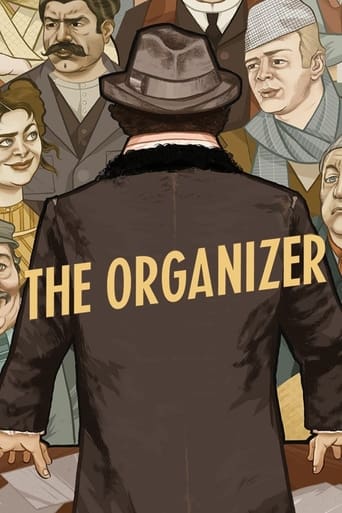KasparM
The difference between this film and a lot of other strike/union related films, is that it has a sense of humor and is not taken with its own self importance. As a matter a fact, the film is quite measured and cautious in its outlook. There are no heroics here, everybody is a full fledged human being with his/her weaknesses and strengths. Mastroianni is particularly wonderful here in a very nuanced performance, where he goes from nebbish professor to inspirational and powerful leader in matters of seconds. The script is very strong and Rotunno's cinematography is excellent. Monicelli injects the film with so many details that hit their mark, that he has gone from a very good director to a great one in my estimation. The early scenes at the factory are truly remarkable in a uniquely cinematic way. They hardly contain any dialogue and put you in the workers place in a remarkably efficient way.Highly recommended.
Arca1943
Most comments on this movie are positive - and quite rightly so. Except for someone who said I Compagni was "depressing". Well, of course it's depressing : it's an Italian comedy ! Why do you think Monicelli and writers Age-Scarpelli abolished the happy end from popular comedy with their milestone farce I Soliti ignoti? Because humor has nothing to do with good feelings. At least, it didn't to the eyes of that crazy movie industry which for a while gave its country of origin the dimensions of a continent.Which brings me to this other topic : is it possible that most comments here were made by people who saw that movie with English subtitles? That can be a problem, especially for comedy. To difference of all other countries of the western world, English speaking markets (United States, England, English Canada) never developed a dubbing industry worth of the name. (Which also means that when they nevertheless try to dub something or other, the result is generally awful). Of course, from the point of view of domestic market dominance, that's excellent : with such a prophylactic wall, no foreign movie can seriously compete with English-speaking productions. (American comedy director Mel Brooks lead the battle a few years ago to have the French farce Les visiteurs dubbed in English, and lost).Sometimes, I agree that subtitles are the least worse solution. But not when it comes to comedy, to farce, to entertainment. A subtitled comedy IS NOT FUNNY, or much less funny than the original-language OR dubbed version. For comedy is a matter of tempo, of timing : the one-liners have to fall in place all at the right millisecond. (Even more so when it's written by Age-Scarpelli, the best comedy writers in movie history!) And if you're busy reading the words down below instead of watching the faces of the actors, most of the time, you miss the shot.To me, the most striking aspect of I compagni (which I saw and re-saw in French as Les Camarades) is that it is surprisingly funny : not unlike Monicelli's and Age-Scarpelli's preceding masterpiece La Grande guerra, I Compagni is a commedia all'italiana, i.e. a tragicomic, satirical fresco where epic and derision are mixed in equal proportions. This is what makes I compagni the best strike-movie ever made - better than Eisenstein's The Strike?!? yes sir! better than John Ford's The Grapes of Wrath?!? yes madam! better than Miguel Littin's Actas de Marusia, starring our beloved red icon Gian Maria Volontè?!? yes comrade! For its humorist's view of life is the perfect antidote against the rhetoric that almost always permeates that kind of film.Mario Monicelli, Age-Scarpelli are ENTERTAINERS. Comedy specialists. For sure, the type of entertainment they were cooking back then was at the antipodes of Hollywood's feel-good, reassuring, consolative recipes, but IT WAS a recipe all the same, attracting spectators in Italian movie theaters by millions and millions. Commedia all'italiana is a SERIAL, an industrial recipe, producing tons and tons of movies each year between 1958 and 1980.My problem here, you see, is one of perception : as soon as a movie is not American, it is almost automatically perceived in the United States as something "for intellectuals", happy few, snob radical-chic, whatever. The idea that foreigners also make ENTERTAINMENT for the million is quasi taboo. Well, it is a grave mistake.As a spectator, I've never been so entertained than by Mario Monicelli's great comedies of the 50s, 60s and 70s - even when they are also very tragic (i.e. "depressing"), as this one evidently is.
merrywood
I Compagni is memorable. When we consider why films move us, affect our lives, indeed, create us to some extent, we think of films such as this. This is not just an artistic triumph for all its filmmakers, but also a moving document of humanity. We take measure of Mastroianni not by his range of performance but by his deep involvement. Like France's Charles Aznavour has his heart in his song, Marcello Mastroianni is fully engaged in his performance. As Professor Sinigaglia in I Compagni, Mastroianni is at his best form. The source of his intensity is not his surface emotion, but the depths of his soul.





